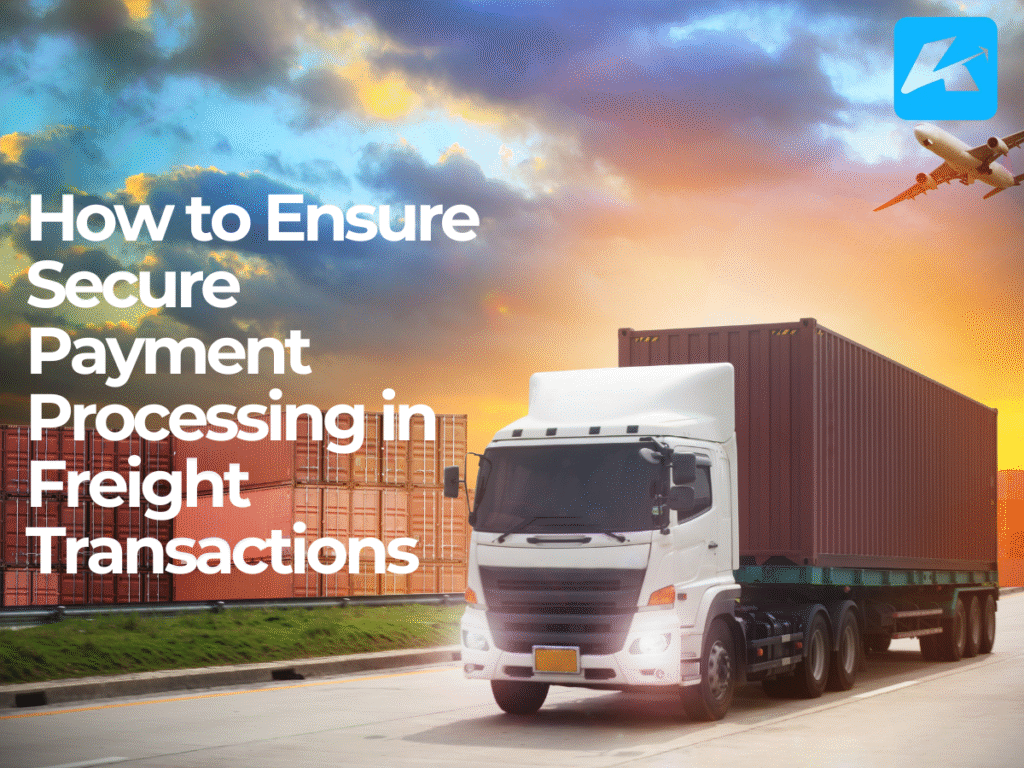In the fast-paced world of freight logistics, getting paid securely and on time is as critical as delivering cargo safely. Whether you’re a shipper, carrier, or broker, payment processing can be a minefield of risks—late payments, fraud, or disputes can derail your business.

How do you protect your funds while keeping transactions smooth?
This guide shares five practical strategies to ensure secure payment processing in freight transactions, helping you stay confident and in control.
1. Verify Your Partners’ Legitimacy
Trust is the foundation of secure payments, but it starts with due diligence. Before engaging with a shipper, carrier, or broker, confirm their legitimacy to avoid scams or non-payment risks.
Check their Federal Motor Carrier Safety Administration (FMCSA) registration and MC number for brokers or carriers. Look up business licenses, credit reports, or reviews on platforms like the Better Business Bureau. For brokers, ensure they have a valid surety bond (minimum $75,000).
Kargage, a Jackson, Mississippi-based broker, prioritizes transparency, making it easy for partners to verify their credentials.
Pro Tip: Use FMCSA’s SAFER database to cross-check a partner’s registration and bond status before signing contracts.
2. Use Secure Payment Platforms
Paper checks and wire transfers are common in freight, but they’re vulnerable to fraud or delays. Modern payment platforms—like ACH, digital wallets, or freight-specific tools—offer faster, safer transactions.
Look for platforms with encryption, two-factor authentication, and fraud detection. Tools like TriumphPay or PayCargo streamline freight payments with built-in security and tracking. These systems also reduce errors, like incorrect account details, that can hold up funds.
Digital payments cut processing time, ensuring carriers get paid faster and shippers avoid late fees.
Action Step: Research freight payment platforms. Choose one with robust security features and integration for your accounting system.
3. Establish Clear Payment Terms Upfront
Misunderstandings over payment terms can lead to disputes or delayed funds. Clear, written agreements prevent headaches by setting expectations for all parties.
Include details in your contract or Bill of Lading (BOL):
- Payment timeline (e.g., net 30 or same-day).
- Method (ACH, check, or platform).
- Penalties for late payments or disputes.
- Freight factoring options, if applicable.
For example, a carrier might require payment within 15 days for refrigerated loads. Communicate these terms before the shipment moves.
Quick Tip: Share and sign payment terms with your partner before pickup. Keep digital copies accessible for reference.
4. Protect Against Fraud and Cyber Threats
Freight transactions are prime targets for fraud, like invoice scams or phishing attacks stealing payment details. Cybercriminals might pose as a broker to redirect funds or hack emails to send fake invoices.
Safeguard your payments:
- Verify Requests: Always call to confirm payment instructions if they come via email.
- Use Secure Networks: Avoid public Wi-Fi for financial transactions; use VPNs for added protection.
- Train Staff: Educate your team on spotting scams, like urgent payment demands or suspicious links.
Kargage helps clients by using secure platforms and vetting partners to minimize fraud risks in transactions.
Best Practice: Set up internal protocols for payment approvals. Require dual verification for large or unusual transfers.
5. Consider Freight Factoring for Stability
Late payments can strain cash flow, especially for carriers waiting 30–90 days for shipper invoices. Freight factoring offers a secure solution by selling your invoices to a factoring company for immediate cash, typically within 24 hours.
The factoring company handles collections, reducing your risk of non-payment. Choose a reputable factor with transparent fees (1–5%) and non-recourse options to protect against defaults.
Factoring ensures steady funds, letting you cover fuel, payroll, or repairs without waiting.

How to Start: Compare factoring companies for rates and reliability. Start with a few invoices to test their service before scaling up.
Putting It All Together
Secure payment processing in freight transactions is about trust, technology, and preparation. By verifying partners, using safe platforms, setting clear terms, guarding against fraud, and exploring factoring, you can protect your funds and keep business running smoothly.
These strategies aren’t just about avoiding risks—they’re about building confidence in every deal. At Kargage, we’ve seen how secure payments empower our clients to focus on delivering freight. But this isn’t about us—it’s about you.
Ready to streamline your freight payments? Call us at (727) 628-3545 for a quote. With these tips, you’re set to process payments securely and thrive in logistics.

